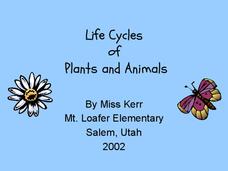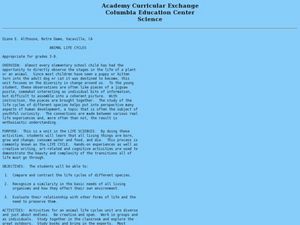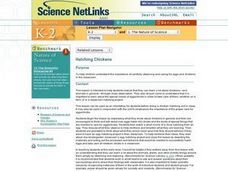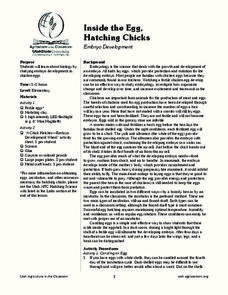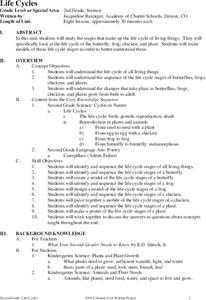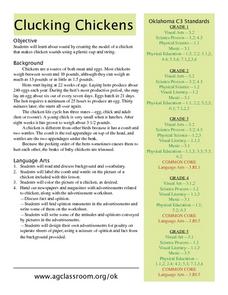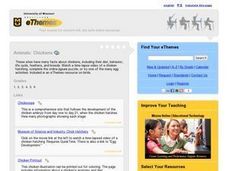Curated OER
Life Cycles of Plants and Animals
What a cute way to introduce life cycles through a PowerPoint! The pictures and basic stages of the lives of butterflies, frogs, and plants are shown with cartoon pictures. there is also a prompt for your pupils to consider other life...
Curated OER
Life Comes in Cycles
Kids are fascinated by chickens and their eggs. Here is a learning exercise has young learners take a look at the four stages in a chicken's life cycle. They have four cycles to organize: egg, chick, young bird, and adult. They have to...
Curated OER
Animal Life Cycle
Students conduct hands-on experiments. In this life cycle lesson, students are able to observe a variety of animals as they travel through their life cycle (brine shrimp, mealworms, frog eggs and chicken eggs). Students respond to what...
Curated OER
Life Cycle of a Butterfly
In this recognizing the life cycle of a butterfly worksheet, students label the stages of development and name and describe the stages of development. Students write 13 answers.
Curated OER
Hatching Chickens
Learners observe how chickens hatch. In this life cycles lesson, students read the book Hatching Eggs: A Step by Step Guide and use an incubator to hatch the eggs. Learners observe the chicks hatching and take care of the chicks by...
Curated OER
Hatching Chickens
Students observe and care for eggs and chickens. In this life cycles lesson, students recall facts about chickens and how they hatch. Students read the article Hatching Eggs in the Classroom and observe the life cycle of the chicken in a...
Curated OER
Life Cycle of a Cockroach
In this science worksheet, students label the stages of the Cockroach's life cycle by naming the stage of development. They list the 3 stages of development and describe each stage on the blank lines at the bottom of the page.
Curated OER
Life Cycles
Third graders investigate the stages of animal life cycles. They examine an egg and compare it to an inanimate object, read a booklet about the life cycle and define key vocabulary terms, and observe a mealworm. Students then design a...
Curated OER
Life Cycle
In this science worksheet, 3rd graders will investigate the life cycle of butterflies, frogs and chickens who hatch from eggs by creating a wheel. Students cut and assemble this wheel with windows that can display the pictures of changes...
Curated OER
Life Cycle of Animals: Butterfly, Cockroach, Mosquito
In these life cycle worksheets, students write true or false for the statements about the life cycles of butterflies, cockroaches, and mosquitoes. Students name 3 examples of animals with life cycles similar to butterflies and...
Curated OER
The Birds of a Feather Flock Together
Fifth graders identify all parts of an egg, and explore their importance to the life cycle of a chicken. Learners compare all sorts of birds and place them in categories based on what they look like. This five-day lesson effectively...
Curated OER
Life Cycle of Animals: Chicken, Duck, Frog
In this animal life cycles worksheet, learners complete a ten question true/false assessment pertaining to life cycles of the frog, duck, or chicken. Students draw the life cycle of each animal in a separate box.
Curated OER
Hatching Egg Lesson
What a great way to introduce life cycles in your classroom! Kindergartners learn about chickens using visual aids, vocabulary lists, and more. If possible, you can have your class watch the process up close and personal by bringing in...
Curated OER
Inside the Egg, Hatching Chickens
Students explore how an egg becomes fertilized. In this biology lesson, students "candle" a variety of eggs in order to determine which ones have been fertilized and which ones haven't. Student use paper plates to create a graphic on the...
Curated OER
Life Cycles
Students explore the life cycle of living things through the eight lessons of this unit. The butterfly, frog, chicken, and plant are inspected and form the basis of the work done in this unit.
Curated OER
Clucking Chickens
A comb, wattle, and beak are three characteristics that describe a chicken. Your class can explore the life of a chicken through reading, art, movement, and music. Using a plastic cup and string, they'll create a pretend chicken that...
Curated OER
Animals: Chickens
Students use the Internet to discover information about chickens. They examine their diet, behavior and life cycle.
Curated OER
Life Cycles
Fourth graders explore life cycles. They examine pictures of the various stages of life cycles and put them in the correct order. Students match pictures of eggs to the correct parents. They discuss the importance of knowing the life...
Curated OER
Inside the Egg, Hatching Chickens
Students conduct an egg candling activity to show the life inside a fertile egg. Students discuss the needs the egg has of the hen, as well as similarities and differences between plants and animals. Students complete a life cycle wheel...
Curated OER
Egg Story Mini Book
In this egg mini book worksheet, students will color, cut out and collate pages to make a simple, picture mini book about the life cycle of a chicken.
Curated OER
Are You Aware?
Bring the five senses to life with a fun science experiment! Kindergartners and first graders read an explanation of the five senses, then identify which items Sophia can sense if she is blindfolded. A science explanation at the bottom...
Curated OER
The Effects of "Recreational" Drugs on the Development of Chick Embryos as a Model for Human Embryogenesis
Young scholars conduct experiments on fertilized chicken embryos to determine the possible developmental effects that various recreational drugs (caffeine, alcohol, nicotine, and aspirin) might have on them.
Curated OER
Get Cracking
Students compare the life cycle of an animal hatched from an egg with one born from its mother's womb. The lesson focuses on dinosaur eggs. They create dinosaur eggs from balloons and papier mache.
Curated OER
Eggs
Students know the following parts of an egg as the yolk, white, shell, membrane, chalaza, and air sac. They also sequence the growth of the chick in the egg. An egg is broken and students touch, smell and see it. They locate the six...


